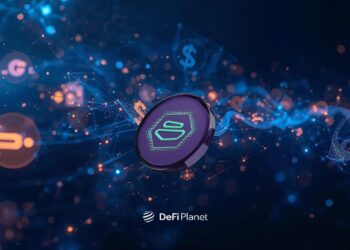DeFi (decentralized finance) has gained popularity among crypto traders due to its efficiency, decentralized nature, and potential for financial gain. However, it’s important to note that these benefits come with tax implications that cannot be ignored.
The proliferation of DEXs (like Uniswap) and smart contract-based lending platforms (like Aave) have contributed to the rise of DeFi. One of the major advantages of DeFi is the absence of middlemen or governing bodies in its trading and lending processes.
Some may assume that government agencies, such as the IRS, will not enforce taxes on DeFi due to its emphasis on financial freedom. However, this is not the case.
This guide comprehensively examines the tax implications of DeFi transactions in various countries, including the United States, the United Kingdom, and Australia.
An Overview of DeFi Taxes
Many countries, including the United States, consider cryptocurrency to be property for taxation purposes. This means that cryptocurrency traders and investors may be subject to income and capital gains taxes as long as they engage in activities that involve decentralized finance (DeFi) protocols.
Let’s shed more light on the two forms of taxes mentioned above:
Capital Gains
When traders sell, exchange, or dispose of their cryptocurrency, they will incur either capital gains or capital losses depending on the changes in the price of the cryptocurrency since it was originally acquired.
Ordinary Income
When cryptocurrency is earned through staking, mining, interest, or any other means, the income based on the cryptocurrency’s value at the time it was received is recognized as ordinary income.
How is DeFi Taxed?
The tax implications of any cryptocurrency transaction should not be underestimated. Most governments have not yet developed specific tax laws to cover all the cases because the space is relatively new and rapidly evolving. What we can do at this point is find useful guidelines or compare the DeFi space to the rest of the cryptocurrency market, which may have slightly more up-to-date regulations.
Lending
The simplest example is lending in a particular cryptocurrency and receiving interest in that cryptocurrency as well (as it is in Australia). For instance, if an individual lends 10 ETH at 10% interest, the interest will be paid back to the lender in ETH. The interest earned in this case falls into the category of “ordinary income.”
When giving a loan, it’s important to be mindful of those that control the funds you’re lending. The transfer of funds to a provider who assumes control over the funds may be treated as a taxable event by the Australian Taxation Office (ATO). However, this is more commonly applicable to conventional crypto lenders than to DeFi, where lenders have control over their funds.
This can get a bit trickier with newer lenders. Interest on platforms like Compound is paid in a platform-specific token called cTokens. The lender’s deposit balance will be displayed in the currency that was originally used to make the deposit, but all funds will be stored in the cToken.
Due to the presence of a second token, the deposit and withdrawal of funds and interest would be treated as a capital gains tax (CGT) event (this is the same thing any other token swap would do when funds or interests are deposited or withdrawn). This is something to consider when choosing a platform and during tax season.
Just like in Australia, lenders in the United States are subject to tax on the interest earned from lending. Income and capital gains tax differ in several ways, one of which is the platform used to file taxes.
It’s important to note that interest earned on platforms that only support a single currency for interest payments will be subject to income tax. The amount of money received as interest will fluctuate with the value of the currency the lender is paid in.
Users must pay capital gains tax (CGT) because of the token swap that happens when they deposit money and take out interest on platforms like Compound (since it uses its token for lending and borrowing purposes).
Borrowing
The main benefit of using one’s crypto as collateral in either Australia or the United States is that it is not considered a capital gains tax event, provided the owner still controls the funds. However, transferring crypto assets to a third party for storage could be seen as relinquishing control over those assets, thus leading to a capital gains event.
Liquidity Pools
Users can provide liquidity to trading pools on DeFi exchanges. They will be rewarded with trading fees when the pair they provided liquidity for is traded. The earnings will be proportional to the amount they have invested in the pool as well as the platform’s trading fee.
When users provide liquidity, they receive LPTs (i.e., liquidity pool tokens). The amount of LPTs the user has will not change, but their value will depend on the pool’s trading fees and demand. A capital gain event will occur when they withdraw their liquidity and convert it back to the currency they originally deposited.
For instance, let’s assume Mr. A wants to invest in Uniswap and receive LPTs in exchange for 1 ETH and 400 DAI. Since he will be exchanging one token for another, the cost basis for the transaction will be the original purchase price of his LPTs.
If, after waiting for three months, Mr. A decides to withdraw his liquidity and receives 1 ETH and 450 DAI, his selling price will be the dollar sum of the 1 ETH and 450 DAI, and his profit or loss will be the difference between the selling price and the purchase price.
Yield Farm Governance Tokens
Users who contribute liquidity to exchanges like YFI or Compound are rewarded with governance tokens that can be used on those exchanges.
When it comes to platform issues, users have a say by voting with their governance tokens. They can also be very valuable.
These token earnings are subject to income tax rather than capital gains tax in the United States and Australia. The tax paid on these tokens is based on the token’s value at the time it was received as a reward.
For instance, if Mr. A contributes to the YFI’s liquidity, he will receive 1 YFI token. Let’s assume the value of the coin when it was airdropped to him was $1,500. The $1,500 will be used to calculate his income tax. This price will also determine his cost base.
In this scenario, if Mr. A decides to hold the coin and sell it a few weeks later for $35,000, his capital gains on the transaction would be the difference between $35,000 and $1,500 (i.e., $33,500).
.jpeg)
How Are DeFi Transactions Taxed in the United Kingdom?
The UK guideline covers the fundamentals of DeFi lending and staking, such as whether or not selling cryptocurrency to a liquidity pool is a taxable event and whether or not the return on investment from DeFi is a capital gain. As explained in the guideline, the differences come from the fact that the economics of the different types of transactions are different.
Important Things To Note About DeFi Taxes
Regulatory agencies are struggling to keep pace with the rapidly evolving DeFi industry, as new protocols and assets are being introduced constantly.
To avoid potential complications, it is recommended that individuals follow standard crypto tax regulations regarding purchases, sales, deposits, and withdrawals, even in areas that currently lack such regulations.
There is a need for better regulation in the areas of insurance contracts, prediction markets, and derivatives. However, it is important to note that:
- Any exchange of one token for another, such as a wrapped token or cToken, is considered a capital gains event.
- Once tokens are transferred to a platform that takes control or ownership of them, users no longer have access to their funds.
- If tokens are received through an airdrop or staking, income tax must be paid on the fair market value of those tokens at the time of the airdrop. If the tokens are held, capital gains tax must be paid using the fair market value as the cost base.
In Conclusion
- Income tax is applied in the United States and most other countries, regardless of whether the income is earned through marketing or investing in DeFi protocols.
- It is important for those involved in DeFi to maintain detailed records of their transactions in order to accurately report them on their yearly tax return.
Disclaimer: This article is intended solely for informational purposes and should not be considered trading or investment advice. Nothing herein should be construed as financial, legal, or tax advice. Trading or investing in cryptocurrencies carries a considerable risk of financial loss. Always conduct due diligence.
If you would like to read more articles like this, visit DeFi Planet and follow us on Twitter, LinkedIn, Facebook, and Instagram.
“Take control of your crypto portfolio with MARKETS PRO, DeFi Planet’s suite of analytics tools.”





















